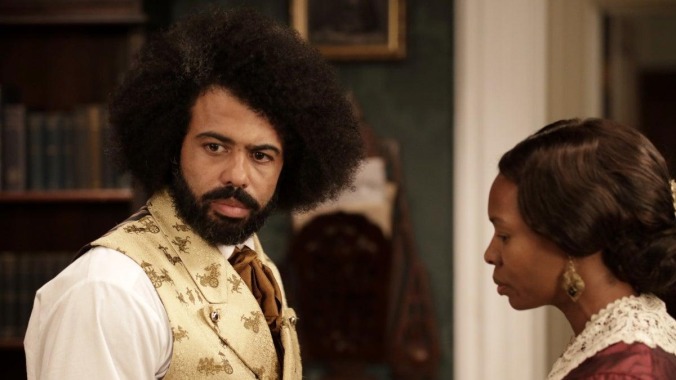Emmy nominee Daveed Diggs on Hamilton and diversifying his body of work post-Broadway
"It’s more a sense of pride at a thing that’s not mine. It belongs to everybody now."

Lin Manuel-Miranda’s breakout musical Hamilton became part of the cultural zeitgeist thanks to its inventive songs and inclusive casting of America’s Founding Fathers. The show made its small screen debut on Disney+ last summer, with a filmed version that triumphantly captured the theatrical experience and scored seven Emmy nominations this year for its original cast members. Among them was Daveed Diggs, who’s been involved with the project ever since Miranda began conceptualizing it in 2012.
Though he starred in various plays before the Broadway hit, Hamilton marked Diggs’ musical debut. And what a debut: The multi-hyphenate played Marquis de Lafayette and Thomas Jefferson from 2015-2016. Since then, he’s exhibited an impressive range in movies and on television, garnering a lead role in TNT’s Snowpiercer adaptation, co-writing and co-starring in the Sundance sensation Blindspotting (which was also adapted for TV), and making appearances in sitcoms like Black-ish, Unbreakable Kimmy Schmidt, and Central Park. He’s also set to play Sebastian in Disney’s upcoming The Little Mermaid.
Most recently, Diggs played another historical figure in Showtime’s limited series The Good Lord Bird, a darkly comedic story about John Brown’s attack on American slavery. His version of Frederick Douglass was met with rave reviews and acclaim, including a Broadcast Film Critics Awards nomination. But it was his roles in Hamilton that scored him that first Emmy nod. The A.V. Club spoke to Diggs about how the play still resonates, and the joy of being up for an Emmy years after his final bow in Hamilton.
The A.V. Club: Hamilton came to Disney+ over a year ago and resulted in massive downloads for the streaming platform. How do you think the essence of the musical transfers to the small screen? Why does it still work after a stage-to-TV shift?
Daveed Diggs: Hamilton became a cultural event while it was still a piece of theater. Taking it to television allowed it to be available to way more people who wouldn’t have been able to see it otherwise. Tickets to watch it on Broadway got really expensive. It’s also about it being the original Broadway cast, so it was a way of somewhat democratizing the viewing process and making it available to people. The real reason it was successful was because of how it was shot. [Director] Thomas Kail figured out a way to make it still feel alive even though it was on stage.
AVC: You started your Hamilton journey with Lin-Manuel Miranda almost a decade ago, but you haven’t been a part of the cast since 2016. Now that you’re separated from the project by a few years, how do you feel about it and about how Hamilton has taken on a life of its own?
DD: It’s pretty great but it is weird to talk about Hamilton during awards season. I’m working on 100 different things, and none of them are Hamilton. It feels like if I had a kid and they were off at college or something, they’re on their own now and I’m very proud of them. It was a great moment in my life and a bunch of my friends made something that we all thought was really good and it ended up being something the world thought was important. That doesn’t happen a lot of the time. You may get one or two of those in your life. It gives me great joy to see it’s still meaningful to people and it can be viewed in a number of different contexts and still resonate. I’m fortunate to have been a part of it. It’s more a sense of pride at a thing that’s not mine. It belongs to everybody now.
AVC: You were part of Hamilton pretty much since its beginning. When you guys were starting out, what was your vision for the play and how do you feel that evolved as you were working on it?
DD: I just thought it was a cool and funny idea and I got to play two characters I loved and hang out with my friends. My metric for Hamilton is my metric for everything. 90% of the things I do with that metric, nobody cares about. This was an anomaly. I had never done a musical or been on Broadway before. There were a lot of new things, so I tried to learn as much as I could and bring the skill set.
 Keep scrolling for more great stories.
Keep scrolling for more great stories.
